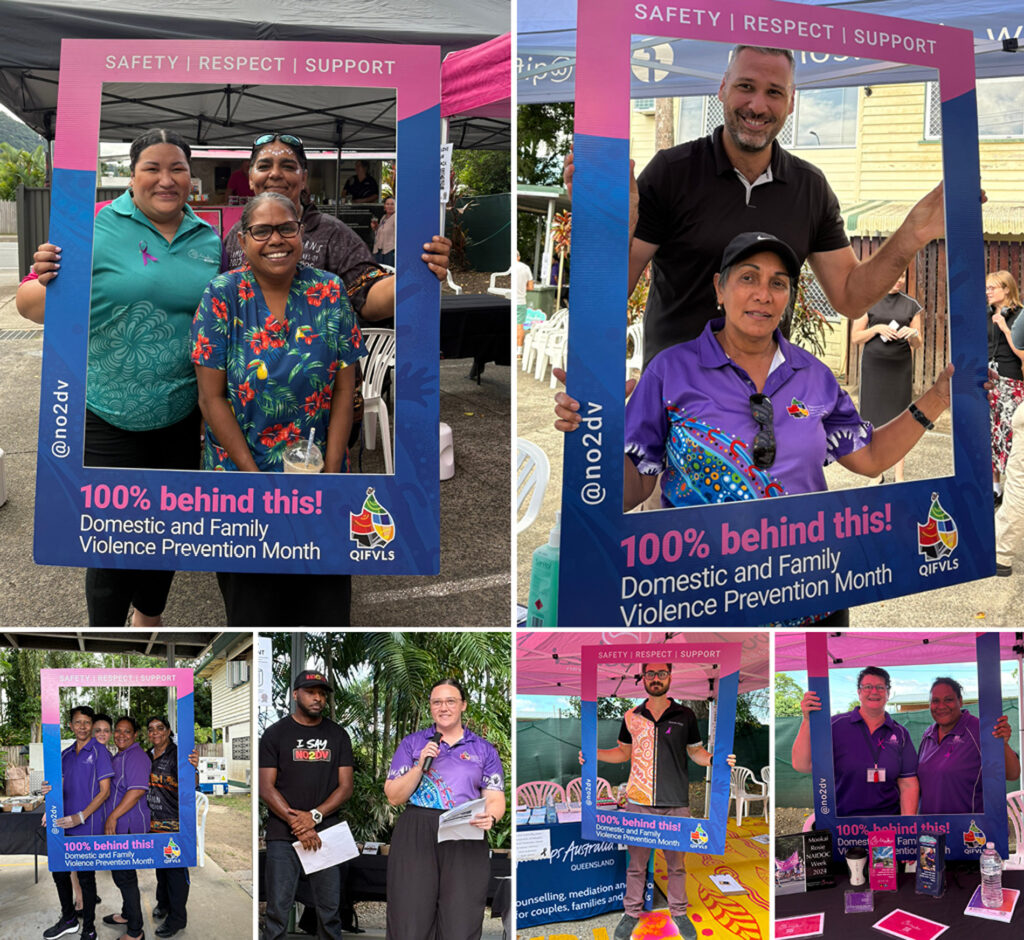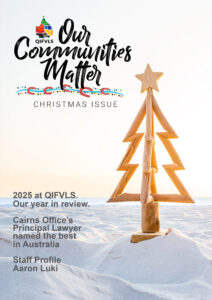



May is Domestic and Family Violence Prevention Month and always one of the busiest periods of the year for the QIFVLS offices. This year was no different with each of the offices ramping up their community event programs. Across the state, the QIFVLS teams engaged with their local communities to spread the messages of safety, respect and support. Each office supported DV Prevention Month with its own unique approach, from joining community marches, collaborating with other service providers to delivering education sessions.
Wujul Wujul
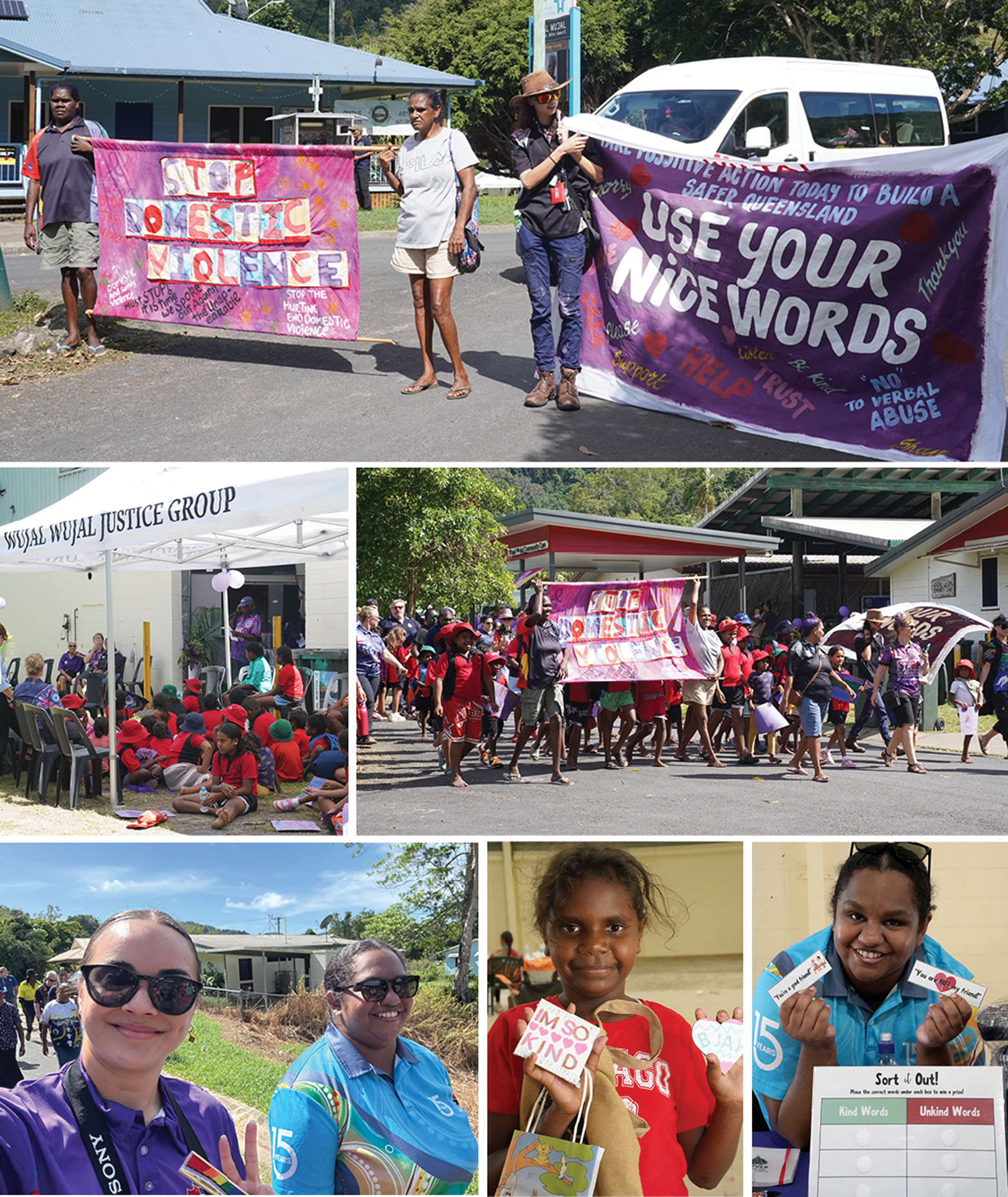
We were delighted that the Wujal Wujal Community Justice Group reached out to QlFVLS to request our participation in this year’s Domestic and Family Violence Prevention Month march and barbeque. Using this year’s theme, Take Positive Action to Build a Safer Queensland, QIFVLS hosted an activity that encouraged young people from the local schools to ‘Use Your Nice Words.’ The Community Justice Group engaged with schools, families, wellbeing services and the Queensland Police Service to share this message within the community.
Cairns
Mookai Rosie, a community-controlled organisation providing support to First Nations women and children undergoing medical treatment in Cairns, asked QIFVLS and RAATSICC to collaborate on a free family fun day for DV Month. Each service set up their own stall, ran a range of activities and provided speakers to discuss their areas of expertise within the domestic and family violence sector.
QIFVLS engaged Café One from Mission Australia to provide free coffee and beverages. Staff from our Cairns Case Management team, along with Events Coordinator Jada Pomare, ran the activities which included a ‘design your own canvas photo’ project where attendees had their photo taken and a printout was stuck to a magnetized canvas. Guests were invited to decorate their canvas using the different craft items supplied. DV Prevention ‘selfie’ frames were also created, with the opportunity to share the theme on social media platforms.
Rockhampton
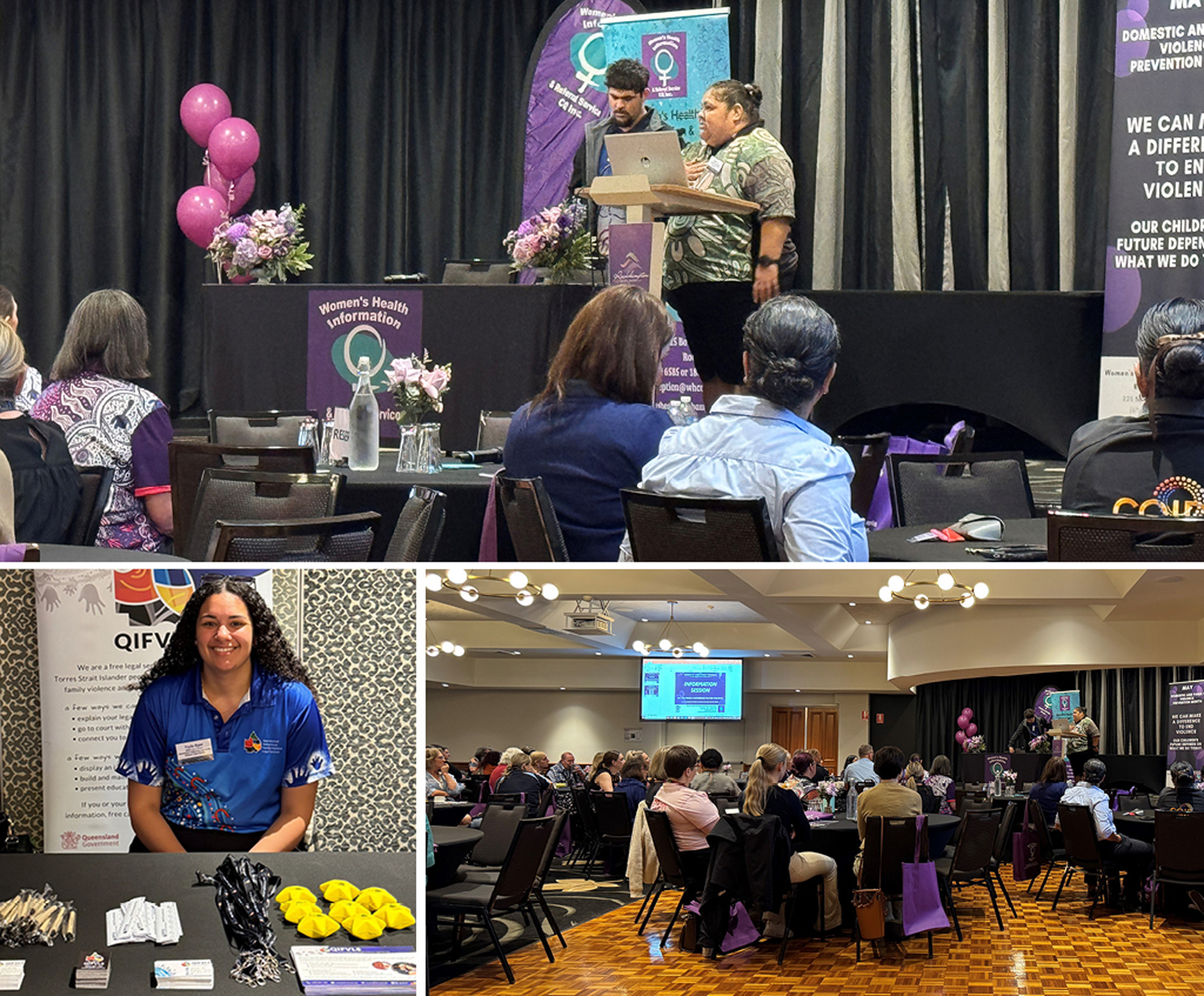
Our Rockhampton office attended the Women’s Health Information and Referral Service DV Month Event at the Rockhampton Leagues Club in May. The event was for both community members and organisations to gain a better understanding and insights on:
- Domestic and family violence in Capricornia
- Non-fatal strangulation in DFV
- Coercive control legislation in QLD with a First Nations lens
- Benefits of counselling to support recovery
- Community roles as active bystanders
- The various support available
Brisbane
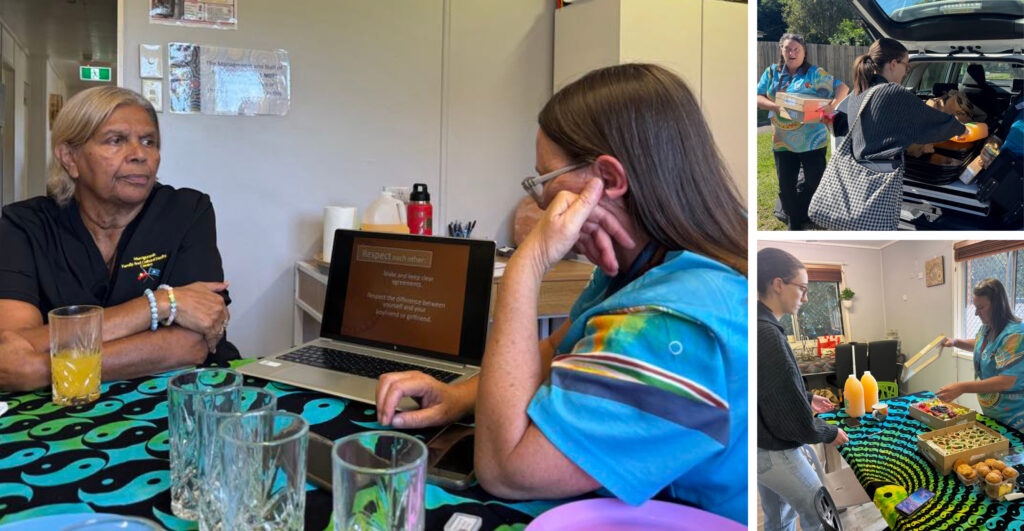
Case Management Officer Lucinda Wass, QIFVLS volunteer Georgia Donehue and Solicitor Hala Hamed attended the Murrigunyah Family & Cultural Healing Centre in Logan to deliver a Community Legal Education session on healthy and unhealthy relationships.
It was a great opportunity to engage with the women at Murrigunyah, share legal information, and have an open discussion about the dynamics of respectful relationships. The session was well received, and our Brisbane team appreciated the warm welcome and participation from everyone who attended.
NPA
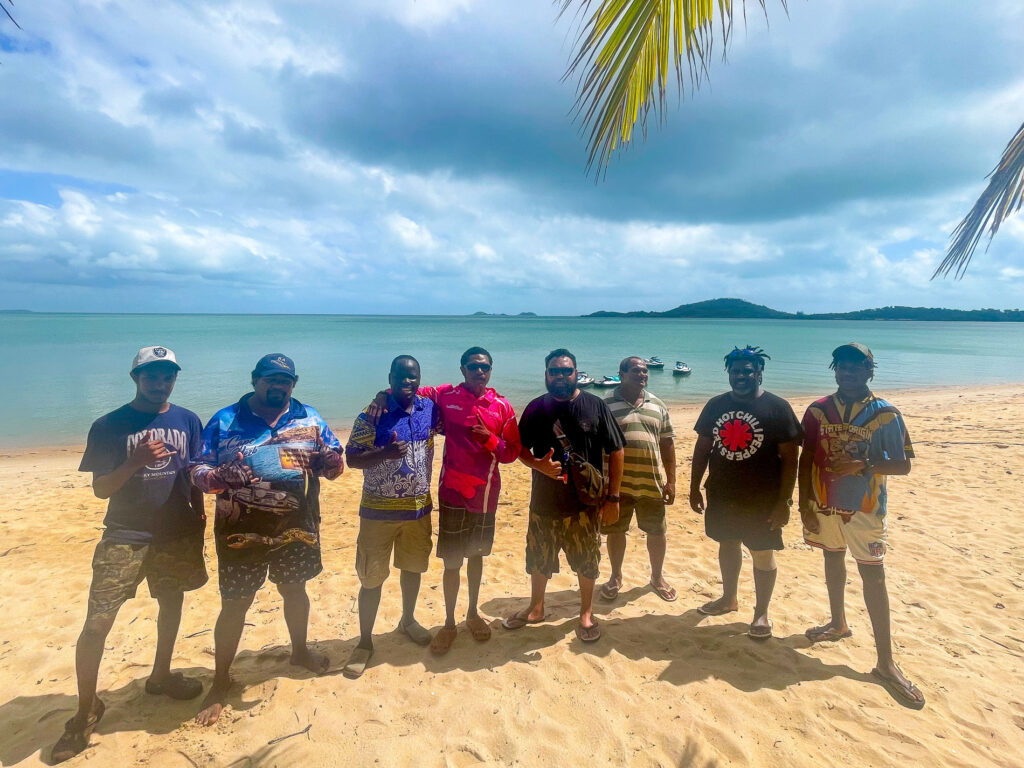
Graduate Solicitor Ocholamero Oroto from QIFVLS’ Bamaga Office was invited by the NPA Men’s Network to discuss domestic and family violence and prevention strategies.
The event, hosted as a yarning circle on Seisia’s waterfront park, included a presentation by Ocholamero on the common definitions of DV, an outline of court process, QPS applications from Police Protection Notices to Protection Orders and Private Applications. It was an interactive discussion with plenty of time for questions.
Notably, one of the group commented that this was his first time hearing the information and acknowledged his new-found awareness of domestic violence laws. Other participants appreciated learning about the difference between civil and criminal DV matters.
Ocholamero reiterated the importance of open communication and learning strategies to resolve conflicts before they escalate.
The event was well received by the men who voiced their interest in continuing the discussion.
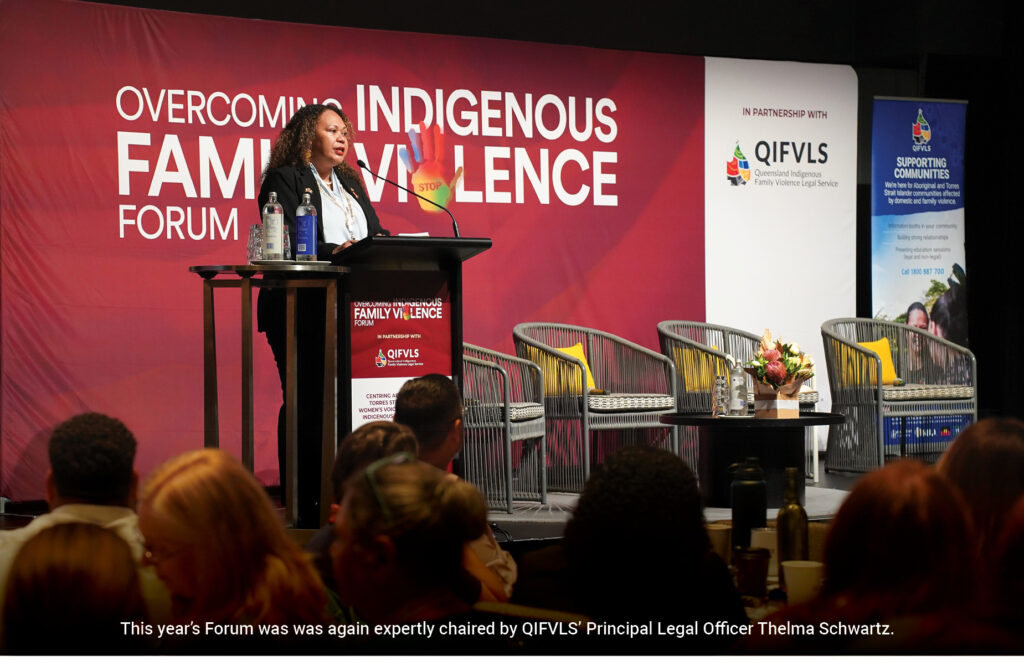
As a proud Aboriginal and Torres Strait Islander community-controlled organisation, QIFVLS was honoured to host our third Overcoming Indigenous Family Violence Forum in May. Once more, the Forum delivered a powerful national gathering focused on advancing culturally safe, community-led responses to domestic and family violence.
Held on Kombumerri Country and grounded in cultural protocols, the Forum brought together over 300 participants from across the continent as well as international visitors, including Elders, frontline practitioners, survivors, community leaders, government and legal professionals. At its heart, the forum affirmed a collective truth: the solutions to violence against our people already exists within our communities.
Key Impact Areas – Forum Highlights
- Community-Led, Healing-Centred Approaches: Solutions must be designed, led and governed by First Nations communities, recognising the interconnectedness of healing, culture, family, and Country.
- Family-Led Decision Making: Families must be central to decisions that affect them, with culturally grounded, empowering responses that uphold kinship strengths.
- Ending Victim-Blaming in Child Protection: Urgent reform is needed to stop systems that punish women for violence done to them. Children must be kept with mothers seeking safety, not removed by default.
- Cultural Integrity and Lived Experience: Cultural knowledge, lived experience, and community wisdom were placed at the centre -honoured as critical to both prevention and healing.
- Men as Protectors and Leaders: The forum reaffirmed the role of Aboriginal and Torres Strait Islander men in healing, cultural leadership, and violence prevention.
- Healing Whole Families: Participants called for restorative, family-centred healing pathways that strengthen kinship and long-term wellbeing.
- Human Right to Safety: Everyone has the right to live free from violence. This must be upheld through culturally safe, anti-racist and trauma-aware systems.
- Collaboration and Systems Change: Strong cross-sector partnerships and investment toward long-term, community-controlled solutions.


The 2025 Overcoming Indigenous Family Violence Forum was held at the QT Hotel Gold Coast with attendee numbers vastly swelling from the previous year’s event in Cairns. The Forum was once again superbly organised by event management specialists, Aventedge.
Following a Welcome to Country by Komumerri woman, Dr Madeline Pugin, the Forum began with opening remarks by Thelma Schwartz, QIFVLS’ Principal Legal Officer and Forum Chairperson. After providing her warm welcome to the large crowd, Thelma introduced the keynote speaker for Day One of the Forum, Antoinette Braybrook AM.
Antoinette Braybrook AM, a respected Aboriginal leader, CEO of Djirra and Co-Chair of Change the Record, delivered a powerful address entitled: ‘In post-referendum world, now every Aboriginal woman’s self-determination must be invested in’.
Antoinette’s address was followed by the first panel discussion of the Forum: Understanding the Parameters of Coercive Control Legislation in Different States with a First Nations Lens. Chaired by Thelma, this discussion explored how the different states approach education on coercive control, how clients can be helped to understand coercive abuse reporting , and understanding the risks associated with criminalising coercive control for First Nations people.
Professor Kyllie Cripps, Director, Indigenous Studies Centre at Monash University led the next panel, with First Nations people sharing their own lived DV experiences. Raw and honest, the panellist’s stories highlighted the systemic failures and strategic solutions needed to address violence against Indigenous women.
Next, Kerry Staines, CEO of FNAAFV, together with QIFLVS’ CEO Wynetta Dewis provided a national context to the work of First Nations FVPLS.
For the hour prior to lunch, the room broke into four yarning circles, each with its own theme to be explored and workshopped.
The afternoon session began with a case study presented by Ashlee Donohue, CEO of Mudgin-Gal, the only Aboriginal women’s centre in metropolitan Sydney, operated entirely by First Nations women.
This was followed by another panel discussion: ‘Reclaiming safe spaces with collective cultural strength: We are bigger than our story’. The panellists included Kowana Welsh, Board Member, Full Stop Australia, Women and Girls Emergency Centre Senior Project Officer, Yatungka Gordon and Executive Officer, Breaking Silent Codes Aunty Chantay Link.
A presentation ‘Assisting Aboriginal and Torres Strait Islander Families Through Difficult Times’ by Mary Doctor and a case study: ‘Justice reinvestment a priority for change in communities’ rounded out a very full first day.

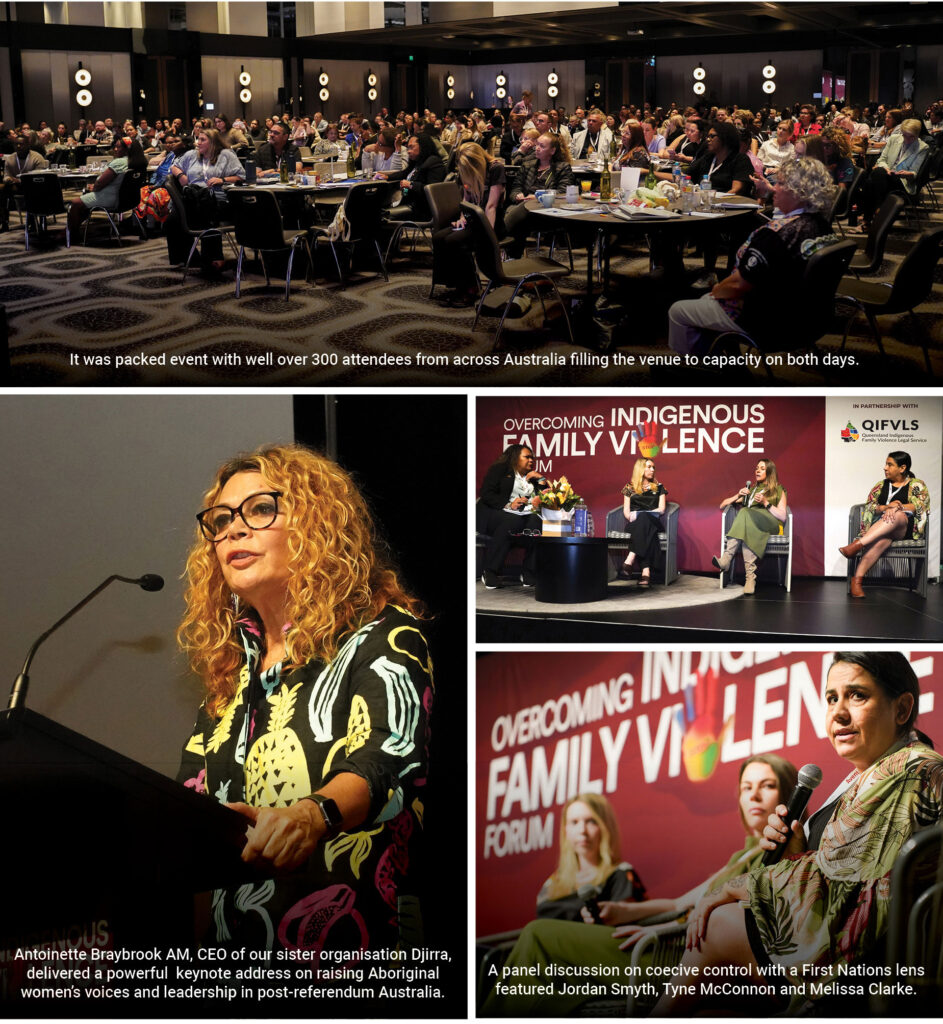


Day Two began with an international perspective, with Mereseini Rakuita, Principal Strategic Lead – Pacific Women and Girls, discussing gender equality in the Pacific nations and its impacts on domestic, family and sexual violence.
This was followed by Isabella Copetti, QIFVLS Cairns office Deputy Principal Legal Officer, presenting: ‘An introduction to Child Protection and its renowned complexities.’
Reflecting the Forum’s national perspective, the next panel discussion featured speakers from the Northern Territory: Toni Eyles & Lee Vanderwarker, Project Officers at North Australian Aboriginal Family Legal Service (NAAFLS), and Bernadette Thomas & Harley Dannatt from Northern Territory Indigenous Family Legal Support Services (NTIFFLS). This discussion focussed on a case study entitled ‘Aboriginal Child Protection Notification and Referral Programs.’
Thelma Schwartz moderated the panel session: ‘Perspectives on Culturally Safe and Child-Centric Responses to Breaking the Cycle of Indigenous Family Violence’ before the room broke into four yarning circles prior to lunch.
The afternoon sessions began with two, men-focussed discussions. Charlie Rowe from Carbal, spoke to the theme of ‘Strong Fathers, Strong Families’ before Nicholas Glauser and Nelson Bieundurry from the Men’s Outreach Service Aboriginal Corporation (MOSAC) discussed the importance of community designed and led programs that work with men.
Her Honour Judge Louise Goodchild from the Federal Circuit and Family Court of Australia provided an update and on the Specialist Indigenous List including changes to the Family Law Act which now requires the Bench to consider Aboriginal and Torres Strait culture in determinations of First Nations matters.
Day Two concluded with Katie Kiss, the Aboriginal and Torres Strait Islander Social Justice Commissioner discussing via video link: ‘Taking a Human Rights-Based Approach to Overcoming Indigenous Family Violence.’
Following Chairperson Thelma Schwartz’s closing remarks, the 2025 Overcoming Indigenous Family Violence Forum came to its conclusion.

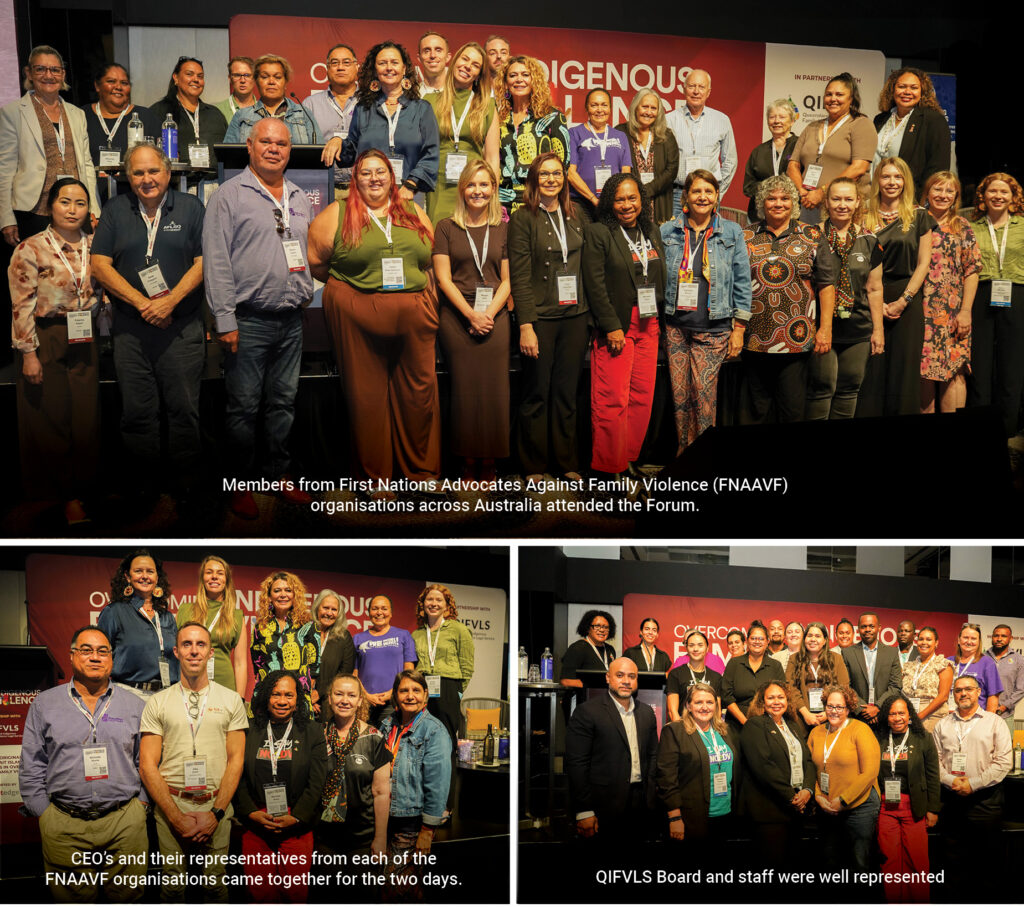
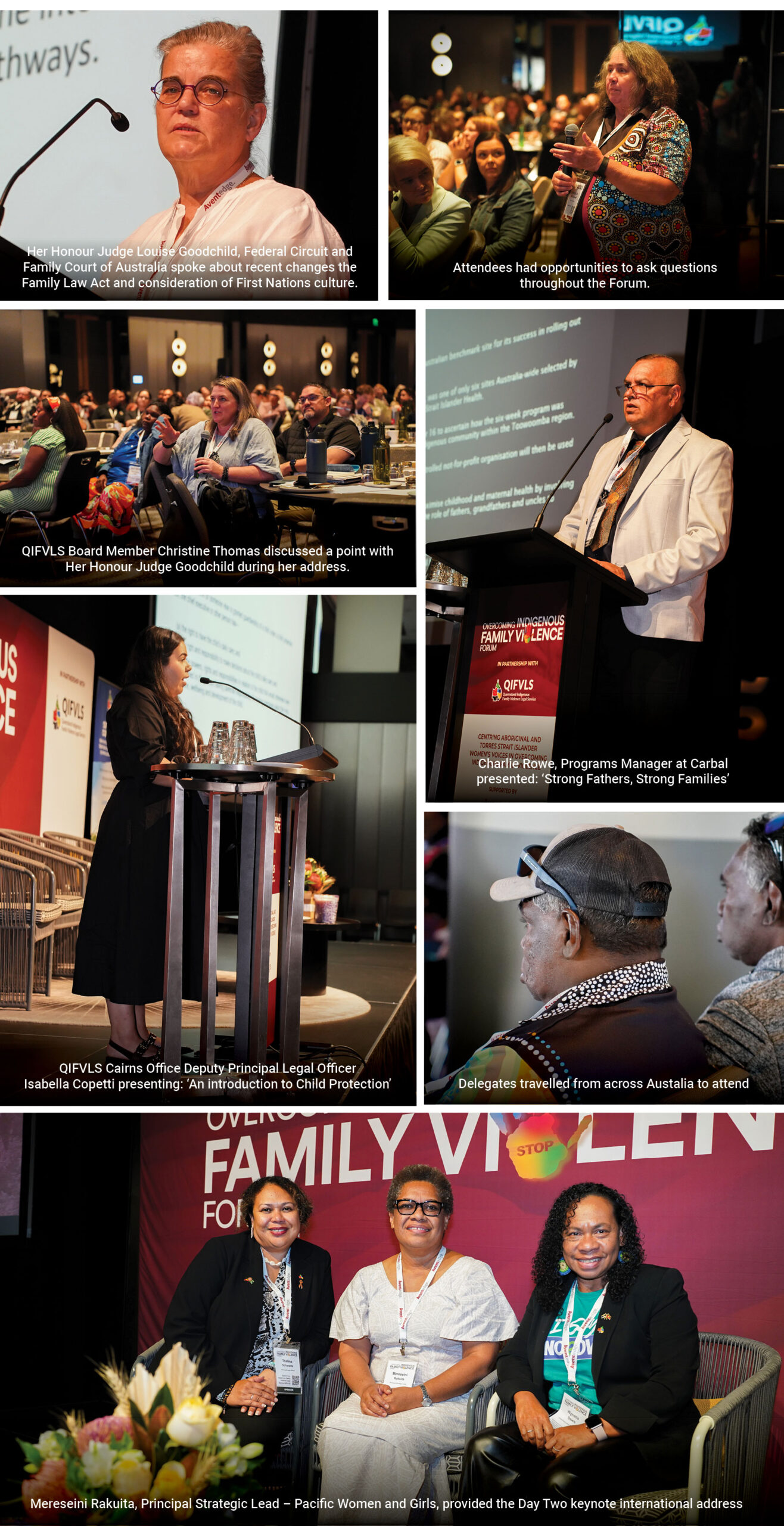

While the Forum concluded its speaker presentations in the hotel ballroom on Wednesday, 100 of the event delegates also booked the Day Three On-Country cultural visit to ‘Journey to Dreaming Mountain.’ Jellurgal Dreaming Mountain, also known as Jellurgal, is a culturally significant site to the local Aboriginal Peoples in Burleigh Head National Park, 45 minutes drive from the Forum venue. Jellurgal Aboriginal Cultural Centre, which resides on the edge of the national park, offered Forum attendees a unique experience to learn about the region’s Aboriginal histories and culture.
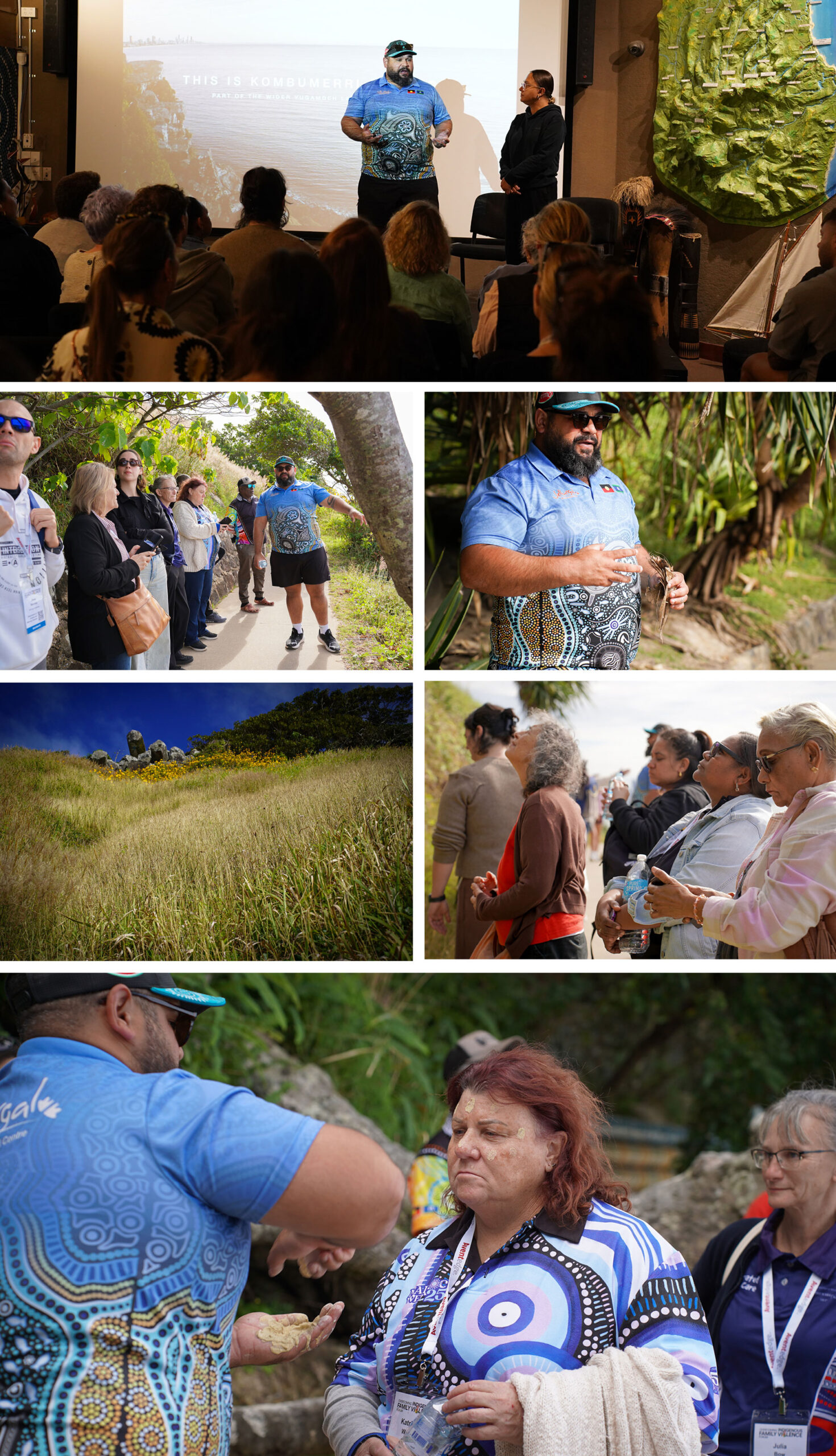
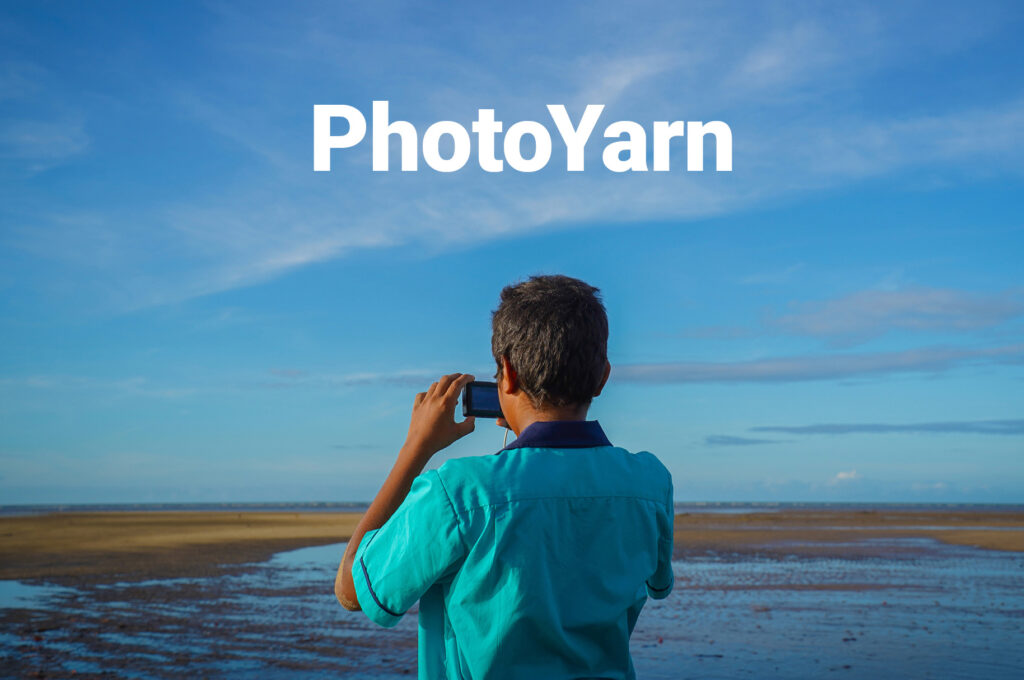
SNAICC, the National Voice for our Children partnered with QIFVLS in May to elevate the voices of young people as part of the National Aboriginal and Torres Strait Islander Family Safety Plan.
SNAICC developed a culturally appropriate version of the existing PhotoVoice concept, renaming it PhotoYarn, to train and encourage Aboriginal and Torres Strait Islander students to take photographs focused on themes of family safety. This framing of the theme of family safety enabled the young people to be self-directed in what they saw as important, while avoiding potentially triggering and re-traumatising young people with lived experience of domestic and family violence.
Over three afternoons in May, the QIFVLS and SNAICC teams worked with Aboriginal and Torres Strait Islander students from different schools across Cairns to explore photography as a creative media to express their feelings.
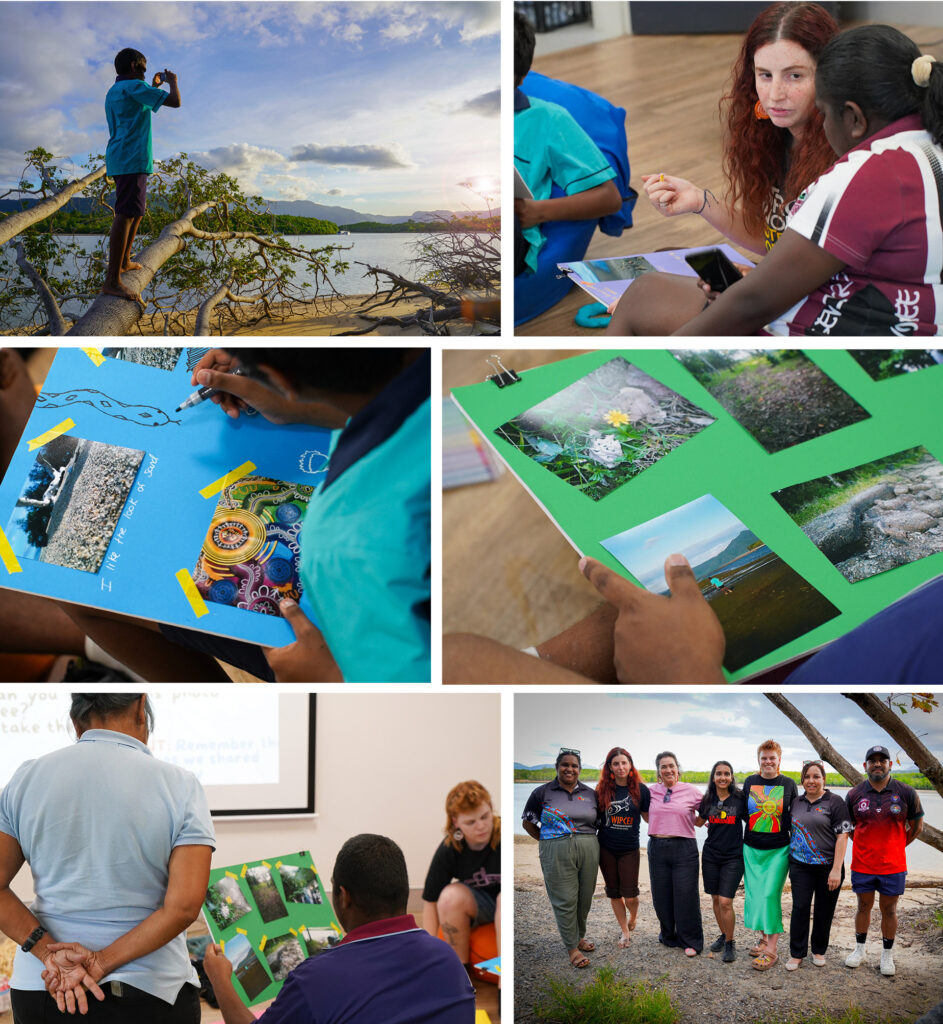


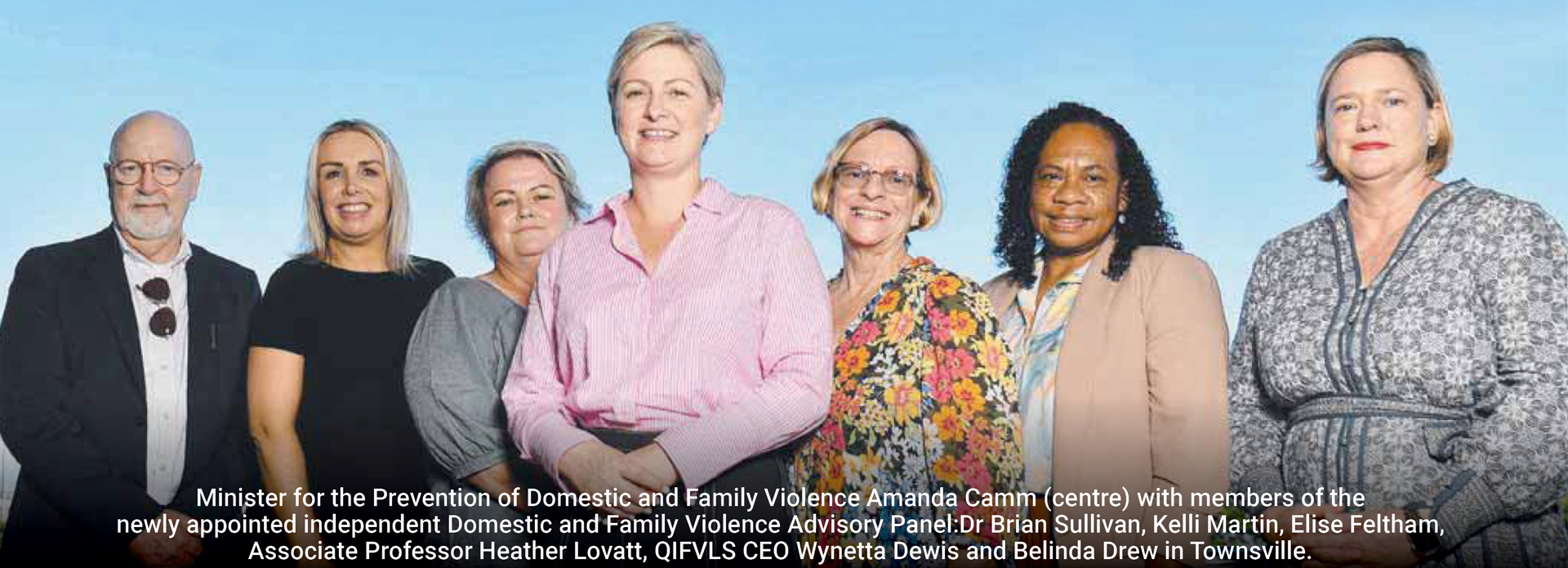
The lawyer who represented the family of murdered Brisbane mother Hannah Clarke is one of five members of a new expert panel tasked with steering Queensland’s domestic violence reforms.
Solicitor Kelli Martin joins the newly established Domestic and Family Violence Advisory Panel, which met for the first time in Townsville on Monday.
The panel includes former police officer and specialist trainer Elise Feltham, QIFVLS CEO Wynetta Dewis, DFV researcher Associate Professor Heather Lovatt, and practitioner-academic Dr Brian Sullivan.
Domestic and Family Violence Prevention Minister Amanda Camm said the panel would shape policy from the ground up.
“This panel will be critical in offering practical advice backed by their extensive experience in working with victims and perpetrators,” she said.
Panellists used their first meeting to raise questions about how little funding goes toward addressing perpetrator behaviour.
“Less than 10 per cent of all DFV funding goes to rehabilitation or support services for those using violence. Unless we shift that over the next three years, we’ll just be chasing our tail,” Ms Camm said.
Ms Camm said the panel had also flagged concerns about the lack of evaluation for perpetrator programs, particularly group-based therapy, and raised issues about waitlists, program effectiveness, and regional gaps in service delivery.
“They’ve validated that we need to evaluate what’s on offer, where the gaps are, and how funding is being used,” she said. “That insight arms me to take real issues back to cabinet and my director general to break down silos across government.”
The panel also discussed tailored responses for First Nations communities.
“We cannot copy and paste Brisbane’s model into the Torres Strait or the Gulf,” Ms Camm said. “Their advice ensures our reforms don’t miss the mark.”
Ms Camm said the advisory group marked a shift away from the “tick-and-flick” approach, with her department now restructuring to consolidate investment across child safety, domestic violence, youth, and disability under one directorate for the first time in decades.
“This gives us a powerful opportunity to deliver truly joined-up prevention and early intervention,” she said.
This article originally appeared the the Townsville Bulletin 27 May 2025. Credit: Taylah Fellows.

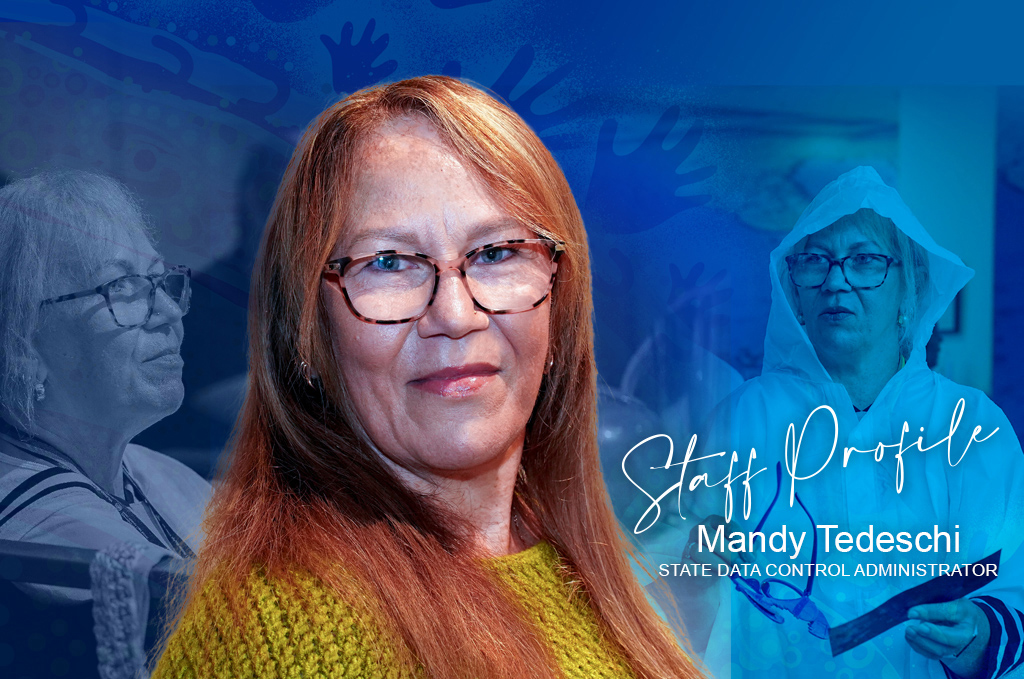
This month, the subject of our staff profile is Mandy Tedeschi, QIFVLS’ State Data Control Administrator.
Mandy is part of our Brisbane office, and after ten years at QIFVLS, is one of our longest serving staff members. Because she generally works from home, there are many in the QIFVLS team who may not be familiar with Mandy and her contribution to our organisation. This month, we aim to correct that, and shine a light on Mandy Tedeschi.
OCM: So Mandy, let’s start at the start. Are you originally a Brisbane gal?
Mandy: I was born in Wondai near Kingaroy and grew up in Murgon, and came to Brisbane when I was 16.
I spent my first 5 years with my mum’s older sister as mum was a single mother and worked away from home. She came home most weekends and on the holidays though. We holidayed at lot in Hervey Bay. I also spent a lot of time with another sister of mum’s (she had 6 sisters), they had 10 kids of their own, so I was always number 11.
I am the oldest in my family with three brothers and a sister.
My mother is Aboriginal, her mother was taken from Mitchell, so she is Gunggari, and moved to Cherbourg. That’s where she met my Grandfather, he’s Koa from Winton, although he was born on Fraser Island.
OCM: Tell us a bit about your life growing up.
Mandy: Well my family were very horsey people and we’d go to rodeos nearly every weekend. We always had a horse in the yard and there were often little Joeys that we’d rescued and that had to be bottle fed.
OCM: Did you enjoy the academic side of your schooling, or were you more of a sporty kid?
Mandy: I didn’t mind school, it was more of a social thing really. I wasn’t much of a studier, I played netball at school and softball but I wasn’t really that sporty.
OCM: So, when did you finish your schooling?
Mandy: I finished Year 11 and moved to Brisbane, which has changed a lot since I first arrived. I remember when Queen Street was still a two way street with cars driving up and down – yeah, that’s how old I am!
Soon after I arrived I got a job with Yellow Cabs as a dispatcher and moved into a little two bedroom flat at Woolloongabba with two cousins and another girl – all four of us squeezed into one little flat!
Then I went to work at a place where they printed the form guide for the Greyhound races, when they had when the Gabba was an actual Greyhound racetrack.
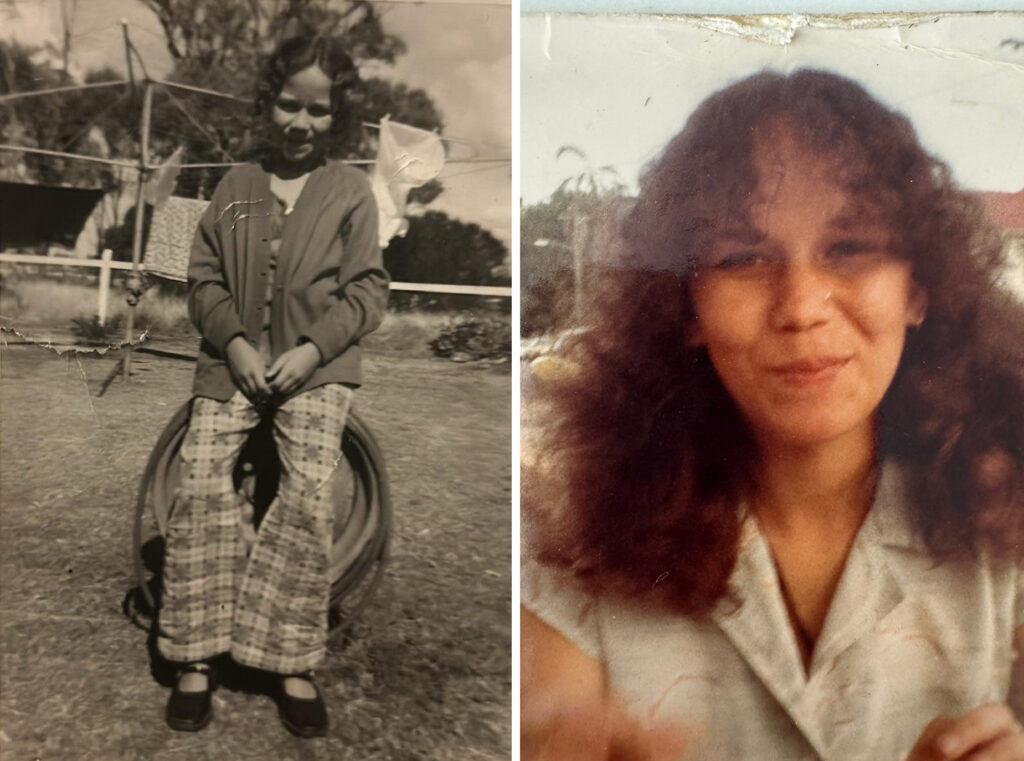
OCM: You mentioned that you liked the social thing, were you a bit of a party animal back in the day in Brisbane?
Mandy: We used to party every weekend. Friday, Saturday, you name it, we were at all the night clubs. We used to go to a place called Hollywoods. We were only 17 at the time but the bouncer lived next door to us. He used to wave us in and really looked after us – he’s actually now my cousin’s partner!
I worked at the greyhound job for a couple of years, and then I had my first child, got married and had my second child – all within three years.
So I was a very young mother at 19. My daughter’s 26 now and I couldn’t imagine her with a child at this point.
Back in those early Brisbane days I had two small boys who were about a year and a half apart and were a bit of a handful. My first son was Dale and the second one is Justin, and he turned 40 this year. Dale passed away when he was 17.
I’ve now been married to David for 41 years. We had Beau in 1993 and Bella in ’99. She works for a place that sells gym wear is a bit of a fitness fiend. Actually, we both sort of are. I’m up at five in the morning to go to different gym classes most days.
We’re also are blessed with two beautiful granddaughters, Ivy and Neiko.
OCM: Of the different jobs over your career, what were the ones that that were the most formative?
Mandy: I did two years with the Commonwealth Employment Service and then went into education, where we worked with the old Training for Aboriginals Program doing school tutoring and all that sort of stuff, then in 1992 I went to at ATSIC where I spent eight years in the Brisbane regional office.
I started off at ATSIC as a project officer and before moving across to the Regional Council Secretariat where we went along to all the Regional Council board meetings. Then I did a stint as the Housing Loans Arrears Officer which I found a bit hard, having to chase people, so I went back to just being a project officer. In 2000 they were doing a restructure and offering redundancies, which I took that up so I could devote my time to my daughter Bella, who was just six months old at the time.
I’d been at home with Bella for about six months when one of the regional councillors from a youth organisation in Brisbane asked me if I was interested in running the South East Queensland regional sports program, so I accepted that and stayed for the next 10 years.
From there, I worked for 18 months for the Native Title organisation on Stradbroke Island – which was really interesting. The trip to work on the water taxi every morning was awesome.
After that I worked for part time for a friend of mine managing workshops for young women and mothers about health and budgeting. We’d show them how to cook it quick and easy meals for their kids and so on. We did that for a little while before I started with QIFVLS in September 2015
OCM: You’ve been with the organisation for a long time.
Mandy: Yeah, 10 years. Wynetta was on my interview panel. I don’t think Thelma had actually started then, I think she started just a little bit after me, although Aaron had just in the Cairns office for his first stint at QIFVLS.
OCM: And do you immerse yourself in traditional Aboriginal culture and your community?
Mandy: Yeah, I go home whenever I can. My aunties run the ration shed up in Cherbourg. My mother and her sisters were all born in Cherbourg but didn’t live there – they lived on a farm just outside Murgon that their father managed.
We come from a very creative family – painters, musicians, footballers, actors. I do a lot of crocheting and have a stall at the Cleveland Twilight makers market once a month where I sell toys, crochet, toys, jumpers and so on. It’s a handmade products market.
That’s my that’s my downtime – constantly making stuff. My husband always says to me: “Don’t you ever just sit and do nothing?” And I always say, no! When I do sit in front of the TV, I’ve got to actually be doing something at the same time.
The other thing I do is help out with Indigenous Women’s Luncheon. It was started by a friend of mine in 2009. This year is our 15th luncheon and it’s being held at the Brisbane Convention Centre. We started off with probably about 100 people and now we’re up to close to 500 women attending.
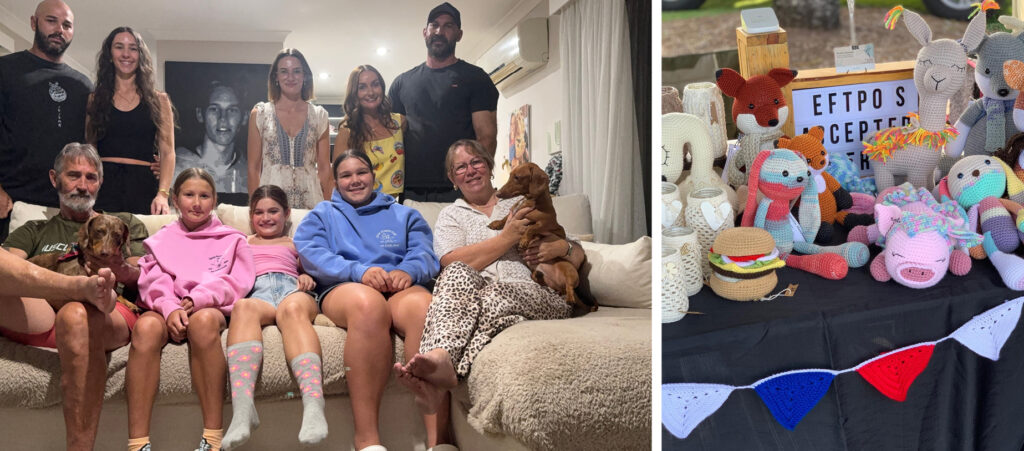
OCM: After 10 years with QIFVLS how have you seen the organisation change over that time?
Mandy: There’s been some really big changes, actually, and changes for the better. I think we went through a period where it was a little bit unsettled but it’s been really good in the last few years. I really enjoy working for the organisation now and I really like my job.
OCM: For those who don’t know you all that well, perhaps just give us an outline of your role at QIFVLS.
Mandy: Well, I enter all of the legal data into Action Step and then draw out all of our reports that we need for funders and the Board and collate all that. So, lots of numbers. I also do all the closing and archiving of the files.
OCM: Your part of the Brisbane office but working from home mostly. How do you find that?
Mandy: I like working from home because I tend to get more done on my own when I’m here by myself and there’s no distractions, nobody around me to talk to me. Every now and again I’ll go into the office, so just to get that little bit of interaction with people. Anyway, I have my two dachshunds to keep me company during the day.
I actually started working form home during the COVID period and my supervisor Principal Legal Officer Thelma Schwartz said, “Well, you’ve proved that the job can be done from anywhere, and as long as I’ve got internet connection, this can stay as a permanent arrangement”.
I could be under a tree somewhere and still be able to do my job.
OCM: Thanks Mandy



When an individual or organisation makes a tax deductible donation to QIFVLS, they can be confident that their funds are going towards making a tangible difference to the safety and welfare of Aboriginal and Torres Strait Islander people experiencing or at risk of domestic and family violence.
Our team are grateful for all donations that help our not-for-profit organisation to continue offering this critical service. Donations of $1,000 or more help fund outreach services to some of Queensland’s most remote ATSI communities.


Are you in search of a rewarding profession that will take you on journeys through the breathtaking landscapes of Queensland? One that promises not only career advancement and skill enhancement, but also attractive perks, substantial travel allowances, and one-of-a-kind professional adventures? Are you drawn to a career that enables you to make a positive difference in the lives of others?
Look no further – your new career awaits you! At QIFVLS, we are dedicated to combating Family and Domestic Violence within Aboriginal and Torres Strait Islander Communities. Our methods encompass education, advocacy, legal reform, court support, and casework assistance. By focusing on early intervention and prevention, our aim is to empower individuals impacted by Family Violence to regain control over their lives. We are in search of outstanding and dynamic individuals who can join us in achieving this mission.
If you envision yourself fitting into this scenario, we encourage you to see what’s available here.


